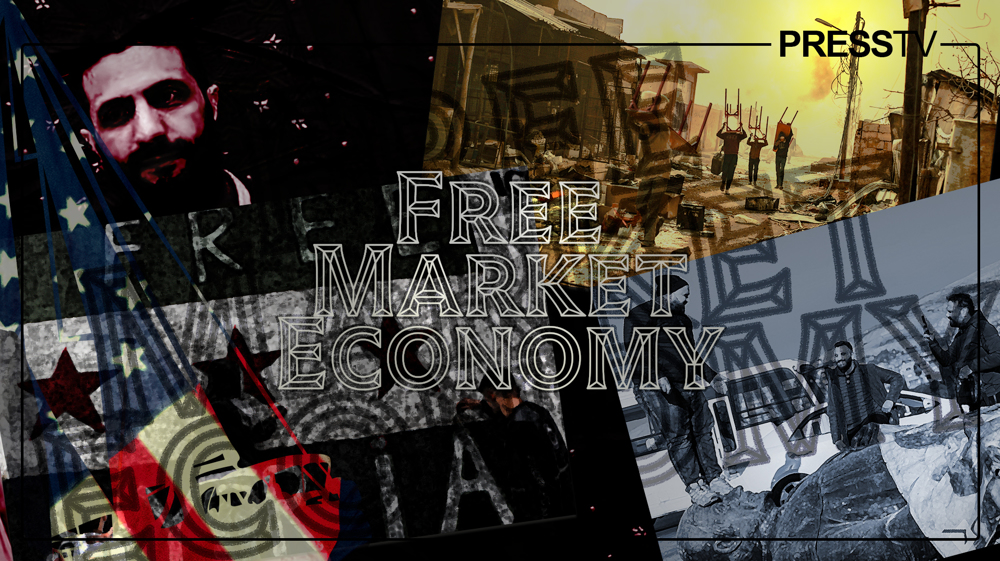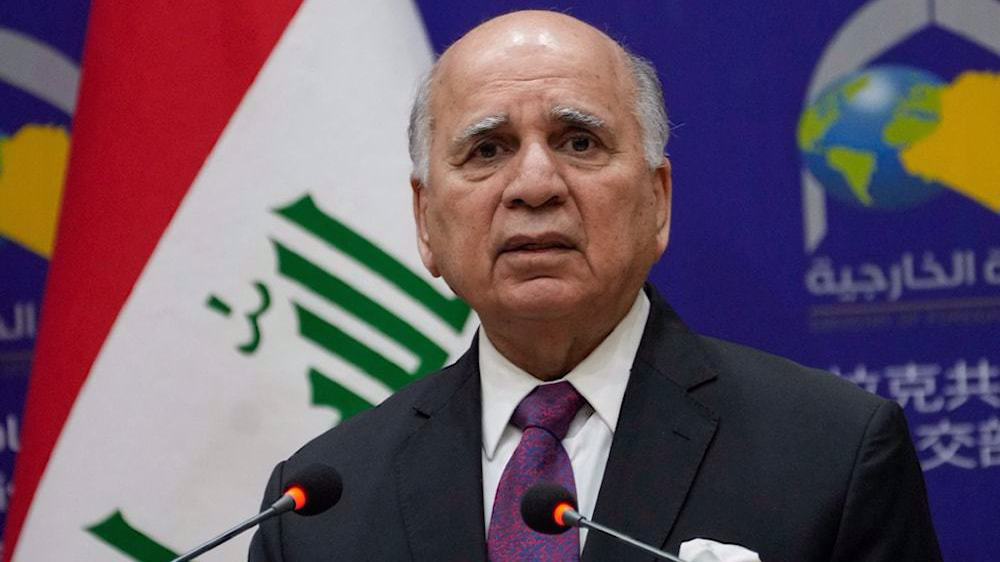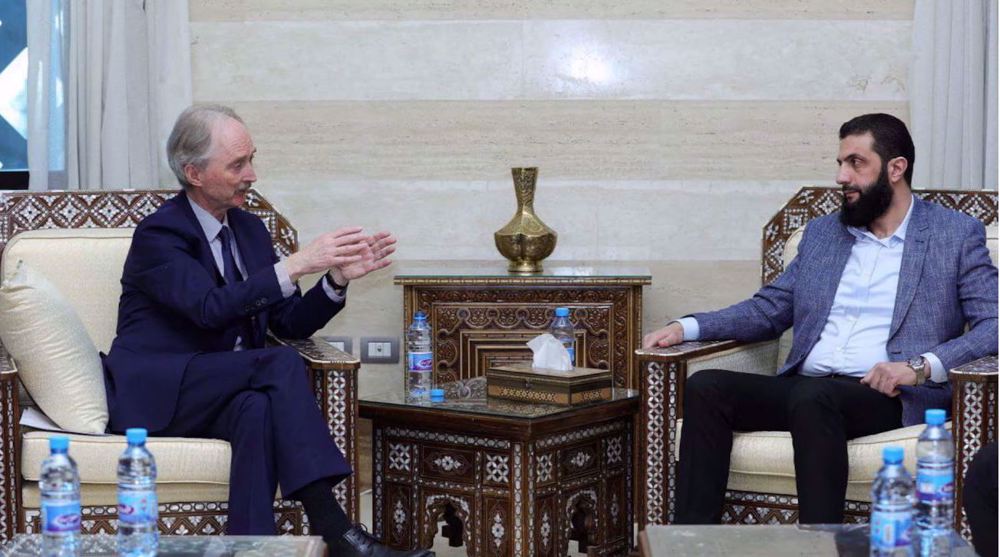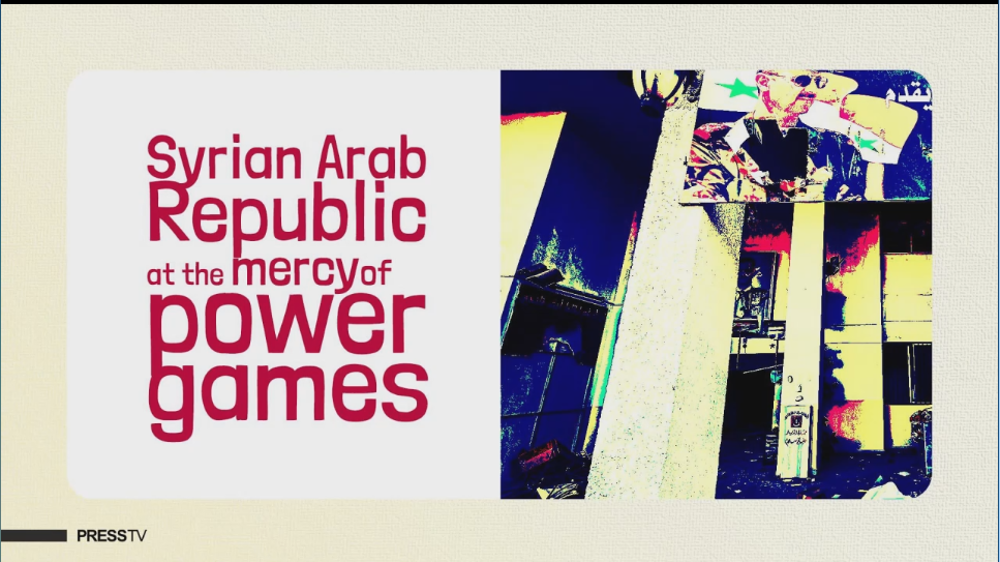Free market or free to exploit: Imperialist agenda of US-backed entities in Syria
By Nahid Poureisa
The declaration of a "free market economy" for Syria by US-backed entities now in the driver’s seat effectively exposes the imperialist agenda fueling the region’s destruction in the name of reconstruction.
Far from promoting prosperity or autonomy, this system serves as a facade for exploitation, where everything—resources, sovereignty, and dignity—is rendered "free" for imperialist control.
This approach exemplifies how capitalism, masquerading as “reconstruction,” thrives on chaos and dependency while erasing national identity.
Imperialism in action
The dramatic collapse of Syria following the departure of President Bashar al-Assad, overrun by militant groups and stripped of its sovereignty, is no accident. It is the result of a deliberate imperialist strategy.
Syria's fall demonstrates how imperialism creates crises, destabilizes nations, and imposes systems that serve external powers at the expense of the people.
In this imposed "free market," the following patterns are evident:
- Israel bombs freely, destroying critical infrastructure without accountability.
- Militant groups, armed and funded by foreign sponsors, continue their operations unchecked.
- Some regional countries mobilize and finance militias, leveraging Syria’s instability for their own geopolitical gains.
- The US and its allies steal Syrian oil, blatantly profiting from the chaos it perpetuates.
A "free market" under such conditions does not serve the Syrian people but facilitates the looting of resources and enables the domination of foreign corporations.
Sovereignty is the first casualty in this system, and without it, Syria cannot define its own future.
Instead, the empire ensures that the land becomes "free" for exploitation. The current scenario reflects an empire-imposed order where the land, dignity, and even resistance are rendered "free" for imperialist domination.
Syria’s state is sovereignty-free, dignity-free, and state-free—a vision crafted by imperialism for total control of the country. Without sovereignty, there is no choice for a nation to accept or reject a free market system.
Syria's state, dignity, and independence have been methodically dismantled, paving the way for an empire-imposed order where Israel solidifies its dominance in West Asia.
Iran’s Leader: Syrian events orchestrated in the command rooms of US and Israel pic.twitter.com/mgYdd1Cf5a
— Press TV 🔻 (@PressTV) December 12, 2024
The geopolitics of West Asia: Iran’s role
In the tension-filled and fertile lands of West Asia, imperialism thrives on instability. For the empire, a disabled region—divided, dependent, and fragmented—is the ultimate goal.
This makes Iran’s role in resisting these forces all the more critical. Iran must not waste time on negotiations with Western powers that seek to undermine its sovereignty and strength. It should:
- Deepen ties with multipolar advocates: Align more closely with nations like Russia and China, which share Iran’s vision for a multipolar world order where sovereignty and equality prevail.
- Strengthen the Axis of Resistance: Palestine remains at the core of the struggle for justice and independence in West Asia, and Iran’s unwavering support for this cause is vital.
- Focus on the South and East, not the West or North: The emerging global order presents opportunities to build partnerships with countries that recognize the US as the primary threat to a democratic and prosperous multipolar world.
Iran’s growing role in shaping this changing global order cannot be overstated. By positioning itself as a leader of resistance and a key player in the multipolar movement, Iran reinforces its commitment to sovereignty, justice, and equality.
The software of resistance and cost of compromise
The ongoing genocide in Gaza and the assassination of Hezbollah leader Sayyed Hassan Nasrallah are stark examples of imperialism’s ruthlessness. Negotiating with the enemy under these conditions is not just a moral failure but a strategic error that compromises the software of resistance—the unity, ideology, and determination of oppressed nations to stand together.
To resist effectively, Iran must:
- Strengthen its commitment to oppressed nations like Palestine, reinforcing the moral and ideological foundation of the Axis of Resistance.
- Deliver clear and strong retaliatory messages to Israel’s miscalculations, demonstrating that aggression against Iran or its allies will have severe consequences.
- Avoid compromises that weaken sovereignty or give imperial powers leverage over the region.
The stakes are high, and the survival of resistance depends on steadfastness in the face of imperialist aggression.
Leader of the Islamic Revolution Ayatollah Seyyed Ali Khamenei’s call to "learn from Syria" is a stark reminder of the consequences of compromise with imperial powers.
Syria’s fate underscores the following critical lessons:
- Sovereignty is irreplaceable: The dismantling of Syrian sovereignty opened the door for imperial exploitation. Iran must safeguard its independence at all costs, recognizing that the loss of autonomy invites domination.
- The enemy is relentless: Imperialist forces, led by the US and supported by its regional allies, will never relent in their attempts to undermine resistance and dismantle sovereign nations.
- Resistance is non-negotiable: Without steadfast resistance, Syria has completely succumbed to imperialist domination. Iran’s commitment to the Axis of Resistance has strengthened the region’s ability to resist and survive.
Syria’s experience demonstrates that the empire views sovereignty as a threat and will stop at nothing to dismantle it. For Iran, the lesson is clear: resistance is the only path to securing sovereignty and dignity.
How American deep state orchestrated ‘regime change’ in Syria pic.twitter.com/dkE2wNYYwy
— Press TV 🔻 (@PressTV) December 12, 2024
Iran’s nuclear negotiations: A broader agenda
The ongoing nuclear negotiations between Iran and global powers are about far more than nuclear enrichment. These talks expose the broader imperialist agenda aimed at weakening Iran’s regional influence and dismantling its role as a leader of resistance against Zionism and imperialism:
- Missile power: Iran’s missile program serves as a crucial deterrent against external aggression, particularly from the Israeli regime. Western powers demand limits on this program, but Iran recognizes it as a cornerstone of its sovereignty and security.
- Support for resistance movements: Iran’s backing of Hamas and Hezbollah resistance movements remains a key point of contention. These alliances are essential to countering Israel’s expansionist ambitions and maintaining the strength of the Axis of Resistance.
- Regional Influence: The US and its allies seek to reduce Iran’s geopolitical presence in Iraq, Syria, and Lebanon. Weakening these ties pave the way for imperialist domination of West Asia.
These negotiations are not just about technical compliance but about preserving Iran’s sovereignty, security, and ideological commitment to resisting imperialism. Any compromise risks undermining Iran’s role as a protector of justice and independence in the region.
The promise of a hollow free market
The "free market economy" imposed on Syria is a facade for imperialist control. It enables external powers to dictate the terms of Syria’s reconstruction, transforming the country into a dependent state with no ability to define its own future. This approach allows imperialism to:
- Exploit Syrian resources, particularly oil, while denying the state access to its wealth.
- Introduce foreign corporations that prioritize profit over development, exploiting the local workforce.
- Fragment the region further, ensuring that no nation is strong enough to challenge imperialist interests.
For West Asia, the promise of a free market is a false one. It is not about economic prosperity or independence but about facilitating the looting of resources and the erosion of sovereignty.
Israel exploits Assad’s fall to seize Syrian land and escalate aggression
— Press TV 🔻 (@PressTV) December 11, 2024
Follow Press TV on Telegram: https://t.co/B3zXG74hnU pic.twitter.com/OUsK2AE272
The vital role of multipolar alliances
As the global order shifts toward multipolarity, Iran must deepen its alliances with strategic partners who share its vision of sovereignty and justice.
Russia and China, along with other nations in the Global South, recognize the US as a primary threat to a democratic and prosperous world.
By strengthening these relationships, Iran can:
- Bolster its position as a key player in the multipolar movement.
- Counterbalance the influence of imperialist powers in West Asia.
- Reinforce the Axis of Resistance, ensuring the region remains resilient against external pressures.
This alignment is not just about economics or politics, it is about preserving the principles of sovereignty, dignity, and resistance that define Iran’s role in the region.
The consequences of capitulation
Those who argue for negotiation in the face of genocide fail to understand the stakes. The ongoing slaughter in Gaza which has claimed over 45,000 lives in 437 days reveals the ruthlessness of imperialism.
Negotiating under such circumstances legitimizes the oppressor and undermines decades of resistance built on sacrifice and unity.
Imperialism thrives on division, compromise, and submission. Any attempt to bend to the demands of imperial powers emboldens them, leading to further exploitation and oppression.
Iran must remain steadfast in its commitment to resistance, knowing that compromise risks dismantling everything it has fought for. Syria’s current state demonstrates how imperialism exploits chaos, erodes sovereignty, and imposes systems that serve its interests at the expense of the people.
For Iran and the Axis of Resistance, the lessons are clear: resist, rebuild, and deepen alliances with multipolar advocates who prioritize sovereignty and justice.
Nahid Poureisa is an Iranian analyst and academic researcher focused on West Asia and China.
(The views expressed in this article do not necessarily reflect those of Press TV.)
Iran seeks South Korea’s assistance for AI, fiber-optic projects
VIDEO | Iran's 'Eqtedar' (Power) maneuver
Israel hits HTS military target in Syria for 1st time since fall of Assad
VIDEO | Press TV's news headlines
Israel has slaughtered 13,000 students in Gaza, West Bank
VIDEO | More Zionist than Zionists: Biden’s legacy to be defined by Gaza genocide
Hamas confirms handing approval of Gaza ceasefire deal to mediators
VIDEO | Iran: Show of strength















 This makes it easy to access the Press TV website
This makes it easy to access the Press TV website